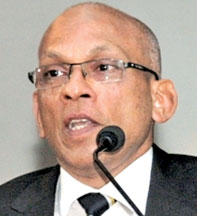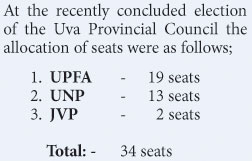Affidavits and crossovers in Provincial Councils
In recent times a political party or group that has been elected by
the free choice of the people are changed overnight with a few
crossovers by way of tendering affidavits. The correct legal position is
as follows;
 |
|
President, Bar Association
of Sri Lanka, Geoffrey Alagaratnam |
1. According to section 3 of the Constitution of Sri Lanka
sovereignty of the republic lies with the people and it is in alienable.
Therefore that sovereignty cannot be transferred to anybody which
includes the elected members as well as the Governor.
This is specially so when the members who submit affidavits are
acting in contravention of the verdict and wishes of the people who
elected them.
In an instance where the people have elected members of different
political parties and the Chief Minister and the Board of Ministers have
been appointed according to the wishes of the people and according to
the membership of the political party that has secured the largest
number of seats in the council. There is no provision in the
constitution or in the 13th amendment to alter this position by
affidavit or otherwise.
President's Counsel and current President of the BASL G. Alagaratnam,
in a question and answer interview states as follows:
"After all, sovereignty according Sri Lanka's Constitution is
unquestionably vested in the people of this country. The BASL has a twin
function, it needs to look after the welfare of the Bar and also address
issues of serious public importance."
This undesirable habit of elected representatives betraying voters
who elected them and still retaining their seats in the Provincial
Council is a matter of public importance and it should be given the
immediate attention of not only the BASL but also other professional
bodies such as the OPA, GMOA and powerful trade unions.
There must be legislation that wherever party affiliation is changed
the individual automatically loses his seat and the next candidate on
the list of that particular political party should be nominated by the
Elections Commissioner subject of course to the right of the effected
individual to canvass the decision of Election Commissioner in the
appropriate court.
Section 154 F - Sub section 4 and the proviso to sub section 4.
 It is also relevant to note that subsection 5 has already been
complied with namely that after the election of the Provincial Council
the Chief Minister was appointed by the Governor and on his advice the
Board of Ministers were also appointed. In my opinion the furnishing of
affidavits does not indicate that any particular member commands the
majority of the council. Further, there is no section in the 13th
amendment or in the constitution which empowers the Governor to sack
already existing members and appointed others instead. It is also relevant to note that subsection 5 has already been
complied with namely that after the election of the Provincial Council
the Chief Minister was appointed by the Governor and on his advice the
Board of Ministers were also appointed. In my opinion the furnishing of
affidavits does not indicate that any particular member commands the
majority of the council. Further, there is no section in the 13th
amendment or in the constitution which empowers the Governor to sack
already existing members and appointed others instead.
Section 4 of the 13th Amendment states as follows:
At the conclusion of the Provincial Council the Governor acting under
this section completes the appointment of the Chief Minister and the
Board of Ministers. That action by the Governor complies with section 4
of the 13th Amendment.
In any event section 154 F of the 13th Amendment readers as follows:
- The governor shall appoint as the Chief Minister, the member of the
Provincial Council constituted for that Province, who in his opinion, is
best able to command the support of a majority of the members of that
Council.
- Provided that where more than one-half of the members elected to a
provincial Council are members of one political party, the Governor
shall appoint the leader of that political party of the Council, as
chief Minister.
- The 13th Amendment or the constitution of Sri Lanka does not
empower already existing Ministers to be sacked and others to be
appointed instead.
Therefore, in terms of the Proviso to Article 154 F (4), it is
mandatory upon the Governor to appoint the leader of such party as the
Chief Minister.
The direction granted to the Governor of a Province by Article 154 F
(4) is limited to situations where a single party does not have more
than one half of the members of the council.
The franchise of the people
The majority of the UPFA over its nearest rival namely the UNP was in
the region of 75,000 votes. Today the position is that the leader of the
UNP has been appointed as the Chief Minister and names submitted by him
have been appointed as ministers with the automatic effect of sacking
the Chief Minister and the existing board of the Ministers. Obviously
there has been a gross violation of the views of the people who by
exercising their franchise elected representatives as indicated above
and the leader of the UPFA was appointed the Chief Minister and the
names submitted by him as the Board of Ministers. This exercise was
carried out with the connivance of the governor on a public holiday
without notice to any of the parties concerned. This was followed by the
same attempt made to grab power in the Central Provincial Council but
due to the very courageous and correct stand taken by Governor of the
Central province these attempts made have miserably failed.
In this era of good governance and respecting the wishes of the
people these methods should not be tolerated at all. As a matter of fact
in addition to the professional bodies a huge responsibility rest on the
media and on civil societies to uphold the democratic rights of the
people.
Section 154 F-1 of the 13th Amendment states, that the Governor shall
in the exercise of his functions do so on the advice of the Chief
Minister. However, "The Governor shall, in the exercise of his
functions, act in accordance with such advice, except in so far as he is
by or under the Constitution required to exercise his functions or any
of them in his discretion.'
Therefore, whenever the advice of the Chief Minister is in
contravention of the imperative provisions of the constitution the
Governor is not bound to act on his advice.
Section 154 sub section 2 & 3
(2) if any question arises whether any matter is or is not a matter
as respects which the Governor is by or under this constitution required
to set in his discretion, the decision of the Governor in his discretion
shall be final, and the validity of anything done by the Governor shall
not be called in question in any court on the ground that he ought to or
not have acted on his discretion.
The exercise of the Governor's discretion shall be on the President's
discretion.
(3) The question whether any, and if so what, advice was tendered by
the Ministers to the Governor shall not be inquired into in any court.
Therefore, where a Governor makes a decision in his discretion
regarding the appointment of a Chief Minister and the Board of
Ministers, that position cannot be altered by affidavits and the
Governor's discretion cannot be challenged in any court of law.
As a great writer of Constitutional Law once said, "what cannot be
held by authority must be conceded with grace."
The writer is the Governor of the Sabaragamuwa Province. |

